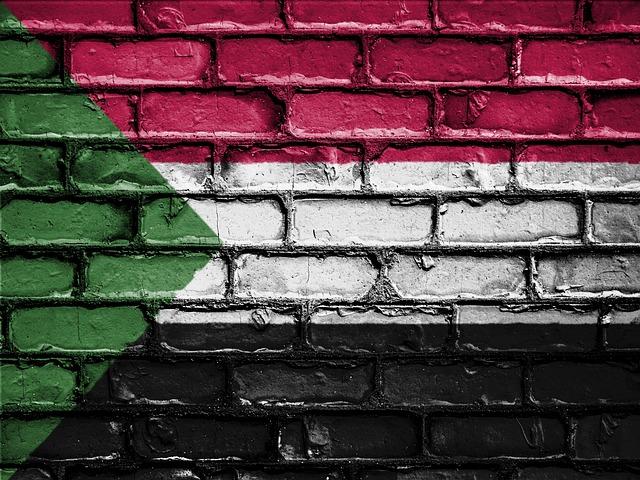Title: Sudan’s crisis and the European Commission’s Humanitarian Response: A spotlight on European Civil Protection Efforts
In recent years,Sudan has faced a series of humanitarian crises,exacerbated by political instability,armed conflict,and natural disasters. As millions of citizens struggle with the consequences of violence, displacement, and food insecurity, international bodies have mobilized to provide critical assistance. Among these, the European Commission, through its civil protection mechanisms, has stepped up efforts to alleviate the suffering of the Sudanese people. This article delves into the European Commission’s initiatives in Sudan,examining the role of the European Civil Protection and Humanitarian Aid Operations in delivering aid,coordinating response efforts,and fostering resilience in a region grappling with multifaceted challenges. With the situation evolving rapidly, an analysis of these efforts highlights not only the immediate impact of humanitarian assistance but also the strategic importance of international collaboration in addressing long-term stability in Sudan.
Sudan’s Humanitarian Crisis and the Role of the European Commission
As Sudan continues to grapple with a devastating humanitarian crisis exacerbated by ongoing conflict, the European Commission has stepped in to provide critical assistance. The situation in Sudan has deteriorated dramatically, with millions of people facing food insecurity, displacement, and a lack of access to basic services. In response to this urgent need, the European Commission has mobilized humanitarian resources to support vulnerable populations, focusing on both immediate relief and long-term recovery efforts. The key areas of intervention include:
- Emergency Food Assistance: Distributing food supplies to families affected by the conflict.
- Health Care Services: Providing medical assistance and restoring health services.
- Water and Sanitation: Ensuring access to clean water and sanitation facilities.
- protection of Vulnerable Groups: Safeguarding children,women,and displaced individuals during this turmoil.
The European Civil Protection and Humanitarian Aid Operations (ECHO) is at the forefront of these efforts, coordinating with NGOs and local partners to streamline the distribution of aid. Their approach leverages both financial support and logistical expertise to enhance the impact of relief programs. Below is a table highlighting EU assistance allocated for different sectors in Sudan:
| Sector | EU Funding (€) |
|---|---|
| Food Security | 12 million |
| health Care | 8 million |
| Water and Sanitation | 5 million |
| Protection Services | 4 million |

Assessing the Impact of European Civil Protection on sudan’s Relief Efforts
The European Civil Protection mechanism has played a crucial role in enhancing the efficiency and effectiveness of humanitarian relief efforts in Sudan. Through coordinated actions, resources, and expertise, it has helped bridge the gap between immediate disaster response and long-term recovery strategies. The support encompasses various aspects, including:
- Logistical Assistance: Streamlining the delivery of essential supplies such as food, water, and medical aid.
- Technical Support: Providing training and capacity-building initiatives to local agencies and relief workers.
- Funding: Allocating financial resources for emergency relief efforts and rebuilding infrastructure.
Moreover, the impact of European Civil Protection can be seen in the enhancement of local response capabilities, allowing Sudanese authorities to manage crises more effectively. By fostering partnerships with local NGOs and international organizations, this mechanism encourages enduring progress and resilience. The following table summarizes key initiatives and their outcomes:
| Initiative | Outcome |
|---|---|
| Emergency Response Coordination | Improved response time in crisis situations |
| Infrastructure support | Rebuilding of schools and hospitals damaged by conflict |
| Community Training Programs | Enhanced local capacities for disaster management |

Challenges Facing Humanitarian Aid in sudan: A Deep Dive
The humanitarian landscape in Sudan is fraught with complexities that hinder effective aid delivery. Access constraints remain a notable barrier; geographical challenges, ongoing conflict, and bureaucratic impediments complicate the logistics of reaching vulnerable populations. Furthermore, the deteriorating security situation not only puts aid workers at risk but also restricts the movement of resources critical for relief efforts. Local actors often face threats from armed groups, which complicates partnerships and the overall trust in humanitarian strategies. Additionally, the recurrent flooding and drought exacerbate the existing humanitarian crisis, limiting agricultural productivity and leading to food insecurity across the region.
moreover, the funding landscape for humanitarian aid in Sudan presents its own challenges. Despite the high needs, there is a concerning gap in donor commitment which has led to underfunded operations and diminished resources for aid organizations.According to the latest reports, only a fraction of the required funding has been secured, constraining the ability to respond adequately to the needs of displaced populations. This financial shortfall results in tough decisions about prioritizing certain demographics over others, leaving many without critical assistance. the confluence of access issues and insufficient funding creates a dire situation that threatens the well-being of millions in Sudan.

Strategic Recommendations for Enhanced European Support in Sudan
In light of the ongoing crises in sudan, it is crucial for the European Union to adopt a multifaceted approach that not only addresses immediate humanitarian needs but also supports long-term stability. Prioritizing collaboration with local organizations is essential; these entities possess the cultural insight and grassroots connections necessary to ensure effective implementation of aid. Considerations should be given to the following strategic initiatives:
- Enhancing funding for local NGOs that are actively working within affected communities to facilitate tailored responses.
- Strengthening diplomatic channels to foster dialog between conflicting parties, thereby creating a conducive environment for peace.
- Investing in capacity building programs to empower Sudanese civil society,with a focus on governance and human rights advocacy.
Additionally, the european commission should leverage its resources by establishing cross-border partnerships with neighboring countries that host Sudanese refugees. This includes addressing the refugee crisis holistically by focusing on key areas such as education, healthcare, and livelihoods. The following table outlines potential areas of intervention and their anticipated impacts:
| Area of Intervention | Anticipated Impact |
|---|---|
| Education Programs | Increased access to quality education for displaced children |
| Healthcare Services | Improved health outcomes and reduced disease transmission |
| Livelihood support | Enhanced economic stability for refugee families |

the Future of Cooperation: Strengthening Partnerships for Sustainable Development in Sudan
As Sudan moves towards a future built on sustainable development, reinforcing partnerships among local entities, international organizations, and the European Commission is essential.Collaboration can not only enhance resource allocation but also ensure that development initiatives address local needs. Key areas of focus for these partnerships include:
- Capacity building to strengthen local governance structures.
- Environmental sustainability through shared knowlege and technology transfer.
- economic diversification to reduce dependency on specific sectors.
- Disaster risk reduction measures to build resilience against natural disasters.
Strategic alliances can mobilize financial resources and technical expertise necessary for impactful interventions. To illustrate the potential benefits of collaborative efforts, the table below outlines successful regional partnerships:
| Partnership | Objective | Outcome |
|---|---|---|
| Sudan-EU Cooperation | Promote sustainable agriculture | Increased crop yields and rural employment |
| Joint Disaster Response Program | enhance emergency preparedness | Improved response time during crises |
| Green Investment Initiative | Support renewable energy projects | Reduction of carbon footprint and energy dependence |
Through a sustained commitment to fostering these relationships, stakeholders can ensure that the path taken not only meets immediate needs but also lays the groundwork for a resilient and equitable future for the people of Sudan.
Concluding Remarks
the ongoing humanitarian crisis in Sudan has prompted significant actions from the European Commission and the European Civil Protection Mechanism. With their commitment to deliver aid and support to the millions affected by conflict and displacement, the European Union has demonstrated its dedication to addressing the urgent needs of the Sudanese population. As the situation evolves, continuous monitoring and collaborative efforts remain imperative to ensure that aid reaches those in need effectively and promptly. The role of international actors, including the European Commission, will be crucial in not only alleviating immediate suffering but also in laying the groundwork for a more stable and peaceful future in Sudan. The global community must stay engaged and responsive to the needs of the Sudanese people as they navigate these challenging times.







